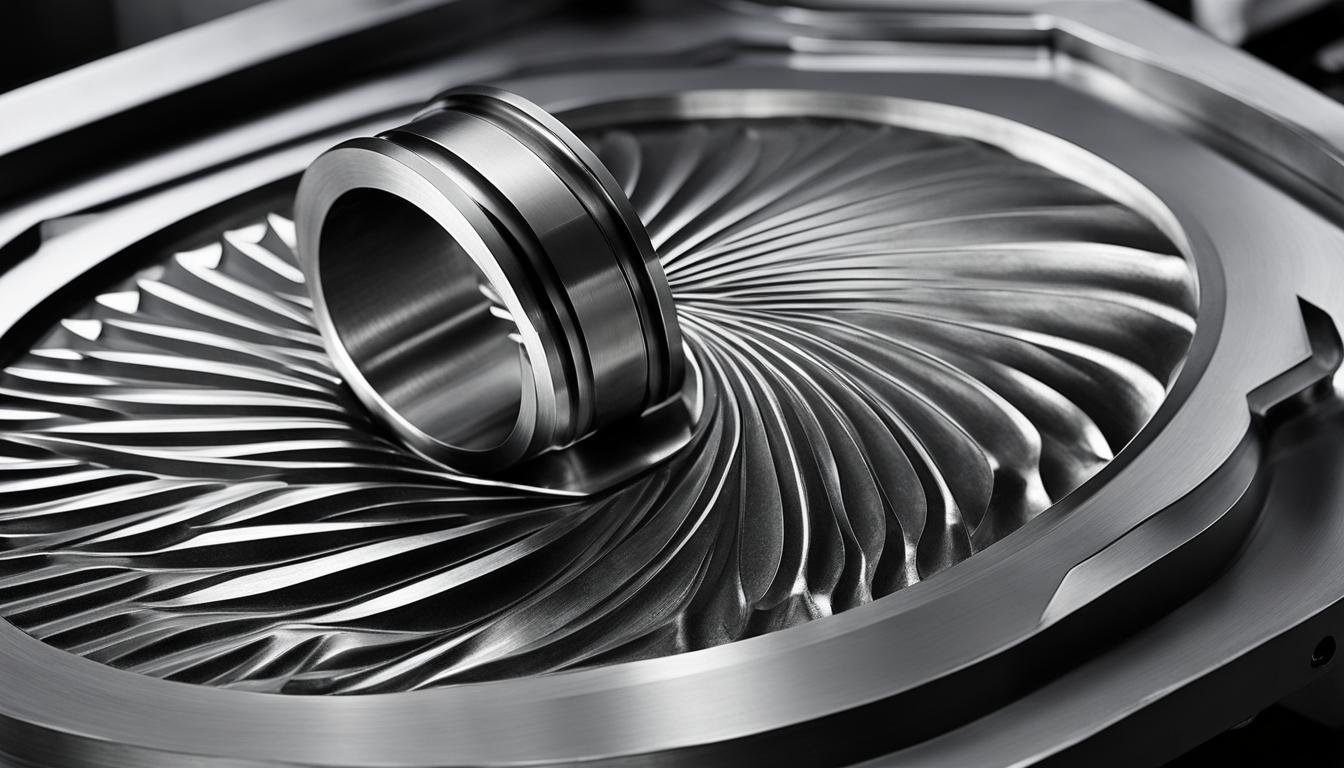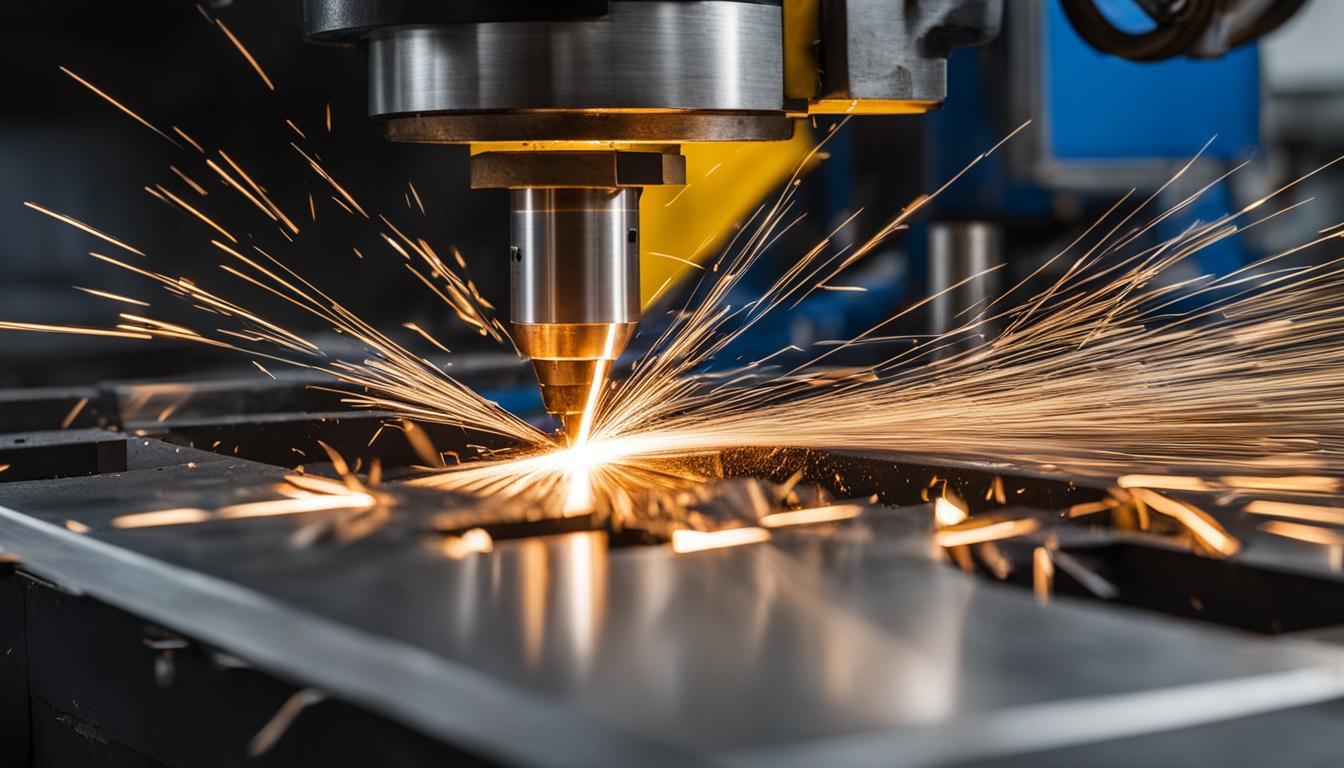Welcome to our comprehensive guide on selecting the best materials for CNC cutting. Whether you’re a seasoned engineer or a newcomer to the world of CNC machining, choosing the right materials is crucial for achieving optimal results. In this guide, we will dive into the world of CNC compatible materials, exploring their characteristics and applications.
CNC machining offers a wide range of possibilities and can work with various materials, including metals and plastics. Each material has its own unique set of properties that make it suitable for different applications. The best materials for CNC are those that possess the right combination of mechanical strength, thermal resistance, and machinability.
Throughout this guide, we will explore popular materials like aluminum, stainless steel, mild steel, alloy steel, and plastics, discussing their advantages and applications in CNC machining. By understanding the strengths and limitations of each material, you’ll be able to make informed decisions that meet your specific project requirements.
So, let’s dive in and explore the world of materials suited for CNC machining. From the best materials for CNC to the important factors to consider when selecting a material, this guide will equip you with the knowledge you need to make the right choices for your CNC cutting projects.
Essential Questions for Selecting the Right CNC Material
When it comes to CNC machining, selecting the right material is crucial for the success of your project. To ensure your CNC parts meet all requirements and perform optimally, you need to consider several essential questions when choosing the material.
1. How will the part be used?
Understanding the intended application of your CNC part is vital. Whether it’s for a mechanical assembly, electronics enclosure, or automotive component, knowing the usage will help you determine the material’s key characteristics, such as strength, durability, and thermal resistance.
2. Will the part be exposed to outdoor or indoor environments?
The environmental conditions your CNC part will be subjected to play a significant role in material selection. Outdoor applications may require materials with enhanced weather resistance, UV resistance, and corrosion resistance.
3. What stress load does the material need to withstand?
Evaluating the stress and load-bearing requirements of your CNC part is essential to ensure its structural integrity and longevity. Consider factors like static or dynamic loads, impact resistance, and torsional strength when choosing the right material.
4. What dimensional tolerance is required?
The dimensional accuracy and precision needed for your CNC part will dictate the material selection. Some materials have better machinability and can achieve tighter tolerances, while others may be more challenging to mill to specific dimensions.
5. What type of fastening is needed?
The type of fasteners and joining methods used in your project, such as screws, welding, or adhesive bonding, will influence the material selection. Certain materials may offer better compatibility with specific fastening techniques.
6. What are the operating temperatures?
Considering the temperature range your CNC part will experience is crucial for material selection. High-temperature applications may require materials that can withstand thermal expansion, while low-temperature environments may necessitate materials with excellent impact resistance at cold temperatures.
7. What is the weight and stress capacity?
The weight and stress capacity of your CNC part will affect its performance and overall project requirements. Balancing factors like strength-to-weight ratio, maximum load-bearing capacity, and the need for lightweight components will guide your material selection process.
8. What are the overall project costs?
Understanding your budget constraints and the cost-effectiveness of different materials is essential. Some materials may provide the desired characteristics but come with higher costs, impacting the overall feasibility of your CNC project.
By answering these essential questions, you will be able to make informed decisions and select the most suitable CNC material that meets your specific requirements. We will now explore different materials compatible with CNC machining in the subsequent sections.
Aluminum: A Robust and Economical Alloy
Aluminum is widely recognized as one of the most versatile materials for CNC machining. Its exceptional strength-to-weight ratio, high thermal conductivity, and corrosion resistance make it a preferred choice for various industries.
Aluminum alloys, such as 6061, 6082, 7075, and 5083, are particularly popular in CNC machining. Each alloy possesses distinct characteristics that cater to a diverse range of applications. From aerospace components to automotive parts and even food containers, aluminum alloys offer exceptional performance and durability.
One of the key advantages of aluminum for CNC machining is its cost-efficiency. It is a relatively affordable material, making it ideal for producing prototypes and custom parts without compromising on quality.
The Advantages of Aluminum for CNC Machining:
- Excellent strength-to-weight ratio
- High thermal conductivity
- Corrosion resistance
- Wide range of applications
- Cost-efficient
Whether you require lightweight components for aircraft or robust parts for automotive applications, aluminum alloys provide a reliable and economical solution for your CNC machining needs.
Stainless Steel: The Strong and Durable Alloy
Stainless steel is a highly sought-after material in CNC machining due to its exceptional strength, wear resistance, corrosion resistance, and machinability. It offers numerous advantages that make it a versatile choice for various applications across industries.

Commonly Used Stainless Steel Alloys in CNC Machining
Several stainless steel alloys are commonly used in CNC machining, each with its own unique properties and applications. Let’s explore some of these alloys:
| Alloy | Properties | Applications |
|---|---|---|
| 304 | Excellent corrosion resistance and high strength | Food processing equipment, architectural components, and general-purpose manufacturing |
| 316 | Enhanced corrosion resistance and excellent temperature resistance | Medical devices, marine applications, and chemical processing |
| 2205 Duplex | High corrosion resistance and exceptional strength | Chemical processing equipment, oil and gas industry components |
| 303 | Improved machining capabilities and good corrosion resistance | Automotive fittings, fasteners, and general precision machining |
| 17-4 | High strength, excellent corrosion resistance, and heat treatable | Aerospace components, firearms, and medical instruments |
Stainless steel finds applications in a wide range of industries, including general-purpose manufacturing, medical devices, marine applications, and chemical processing. Its durability and resistance to corrosion make it an ideal choice for parts and components that require longevity and reliability.
Mild Steel: The General Purpose Alloy
Mild steel, also known as low-carbon steel, is a versatile and cost-effective option for CNC machining. It offers a range of benefits, including good mechanical properties, machinability, and weldability. Mild steel alloys such as 1018, 1045, and A36 are commonly used in CNC machining for various general-purpose applications.
Here are some key reasons why mild steel is favored in CNC machining:
- Good Mechanical Properties: Mild steel possesses favorable mechanical properties, including moderate tensile strength and excellent ductility. Its malleability allows for ease of forming and shaping during the CNC machining process.
- High Machinability: Mild steel is known for its exceptional machinability, making it easy to cut, drill, and machine into precise shapes and sizes. This characteristic reduces overall machining time and improves efficiency.
- Weldability: Mild steel exhibits excellent weldability, making it suitable for applications that require joining multiple components. It can be easily welded using common welding techniques without experiencing significant distortion or weakening.
Mild steel alloys find widespread use in various general-purpose applications in CNC machining, such as:
- Jigs and Fixtures: Mild steel’s affordability and versatility make it an ideal choice for fabricating jigs and fixtures used in manufacturing processes across industries.
- Machinery Parts: Mild steel alloys are commonly used in the production of machine parts due to their reliability, durability, and low cost.
- Structural Components: Mild steel is often employed in the construction of structural components like beams and columns, thanks to its strength and ease of fabrication.
Overall, mild steel’s desirable properties and cost-effectiveness make it a go-to material for many CNC machining projects requiring general-purpose applications.
| Advantages of Mild Steel for CNC Machining | Applications |
|---|---|
| Good mechanical properties | Jigs and Fixtures |
| High machinability | Machinery Parts |
| Excellent weldability | Structural Components |
Alloy Steel: The Tough and Wear-Resistant Alloy
Alloy steels are a popular choice for CNC machining due to their enhanced hardness, toughness, fatigue resistance, and wear resistance compared to mild steels. These steels are designed to withstand demanding conditions and offer superior performance in various applications.
Two commonly used alloy steels for CNC machining are:
- Alloy Steel 4140: This alloy steel is known for its high strength, excellent toughness, and good machinability. It is often used in general-purpose applications, such as gears, shafts, and tooling.
- Alloy Steel 4340: With its exceptional strength, toughness, and wear resistance, this alloy steel is widely used in tooling, power transmission, and other demanding applications. It exhibits excellent fatigue resistance and is suitable for high-stress environments.
Both alloy steels 4140 and 4340 offer distinct advantages in CNC machining, making them ideal options for applications that require strength, durability, and wear resistance. These steels can withstand heavy loads, provide reliable performance, and ensure long-lasting functionality.
Comparison between Alloy Steel 4140 and 4340:
| Properties | Alloy Steel 4140 | Alloy Steel 4340 |
|---|---|---|
| Strength | High strength | Exceptional strength |
| Toughness | Excellent | Excellent |
| Wear Resistance | Good | Excellent |
| Machinability | Good | Fair |
| Applications | General-purpose, tooling | Tooling, power transmission |
Alloy steels are a reliable choice for CNC machining projects that require tough, wear-resistant materials. Whether it’s for general-purpose applications or specific tooling requirements, alloy steels like 4140 and 4340 offer the strength and durability needed to meet the demands of challenging environments.

Plastics: Lightweight and Versatile Materials
Plastics are highly sought after for CNC machining due to their exceptional combination of light weight and versatility. CNC-machined plastic parts offer numerous benefits in a variety of industries, including automotive, electronics, and consumer products. Plastic materials, such as ABS, nylon, polycarbonate (PC), POM (Delrin), PTFE (Teflon), HDPE, and PEEK, are commonly used for CNC machining projects.
These plastic materials possess unique properties that make them suitable for specific applications. For instance, ABS is known for its impact resistance and affordability, while nylon exhibits exceptional tensile strength and high wear resistance. Polycarbonate (PC) offers remarkable transparency, impact resistance, and heat resistance, making it ideal for applications that demand optical clarity. POM (Delrin) is favored for its excellent dimensional stability and low friction properties, enabling precise and smooth mechanical movements. PTFE (Teflon) stands out for its exceptional chemical resistance, non-stick properties, and low friction coefficient. High-density polyethylene (HDPE) possesses excellent chemical resistance and is widely used for applications involving water and chemicals. Lastly, PEEK is a high-performance plastic with remarkable mechanical strength, heat resistance, and chemical resistance, making it suitable for demanding environments.
Plastics used in CNC machining bring several advantages to the table. Their lightweight nature allows for the production of lightweight parts, making them ideal for applications where weight reduction is crucial. Additionally, plastics can offer electrical insulation properties, making them suitable for electrical and electronic applications. CNC-machined plastic parts also exhibit excellent resistance to chemicals, allowing for their use in harsh environments. With their wide range of properties, plastics provide designers and engineers with considerable design flexibility and innovation potential.
Advantages of Plastics for CNC Machining:
- Lightweight nature facilitates weight reduction in parts
- Electrical insulation properties for electrical and electronic applications
- Chemical resistance for use in harsh environments
- Design flexibility and innovation potential
Applications of CNC-Machined Plastic Parts:
The versatility of plastics enables their use in various applications across different industries:
| Industry | Applications |
|---|---|
| Automotive | Interior components, dashboards, trim parts |
| Electronics | Housings, enclosures, brackets, connectors |
| Consumer Products | Prototypes, promotional items, packaging |
With the ability to produce intricate designs, precise features, and complex geometries, CNC machining of plastics offers a cost-effective solution for creating functional prototypes and end-use parts. Plastics provide the flexibility, strength, and durability required for a wide range of applications, making them a go-to choice for CNC machining projects.
Material Selection Guidelines: Strength, Temperature, and Machinability
When it comes to CNC machining, selecting the right materials is crucial for optimal performance and cost-effectiveness. Considerations such as material strength, operating temperature, and machinability play a vital role in the selection process. By understanding these guidelines, you can make informed decisions and choose materials that meet your specific engineering needs while staying within your budget.
Material Strength
Material strength is an essential factor to consider when selecting materials for CNC machining. Different materials have varying tensile yield strengths and hardness levels, which determine their ability to withstand mechanical stress and load-bearing requirements. When evaluating strength, it’s essential to match the material’s properties with the intended application to ensure structural integrity and longevity.
Operating Temperature
The operating temperature of the CNC machined part is another critical consideration. Different materials exhibit different temperature resistance properties. Some materials, such as high-temperature alloys or specialized plastics, are designed to withstand extreme heat or cold conditions. Understanding the operating temperature range of your application will help you select materials that can maintain their structural integrity under those specific thermal conditions.
Machinability
Machinability refers to how easily a material can be shaped, cut, and processed during the CNC machining process. Some materials, like aluminum, stainless steel, and mild steel, are known for their excellent machinability, making them popular choices. However, certain materials, such as high-strength alloys or exotic metals, may be more challenging to machine due to their toughness or hardness. Considering machinability is crucial as it impacts the overall cost of the machining process and the efficiency of production.
| Material | Strength | Operating Temperature Range | Machinability |
|---|---|---|---|
| Aluminum | High strength-to-weight ratio | -250°C to +300°C | Excellent |
| Stainless Steel | High strength and corrosion resistance | -100°C to +800°C | Good to Excellent |
| Mild Steel | Good overall mechanical properties | -50°C to +350°C | Excellent |
| Alloy Steel | High strength, toughness, and wear resistance | -100°C to +500°C | Good to Excellent |
| Plastics | Variable strength depending on type | -70°C to +200°C | Variable |
Metal vs. Plastic: Making the Right Material Choice
When it comes to CNC machining, the choice between using metal or plastic materials is an important decision that can significantly impact the outcome of your project. By understanding the differences and advantages of each material, you can make an informed choice that aligns with your specific requirements.
Metal Materials for CNC Machining
Metal materials offer high strength and thermal resistance, making them ideal for applications that demand durability and stability. Metals such as aluminum, stainless steel, mild steel, and alloy steel are commonly used in CNC machining due to their mechanical properties and versatility.
Advantages of Metal Materials
- Strength and Durability: Metals provide excellent strength and can withstand heavy loads and high stress conditions.
- Thermal Resistance: Metal materials have high melting and operating temperature capabilities, making them suitable for applications exposed to heat and extreme environments.
- Machinability: Metals are generally easier to machine, allowing for precise and complex parts to be manufactured with ease.
Plastic Materials for CNC Machining
Plastics offer a range of physical properties and characteristics that make them highly versatile materials for CNC machining. They are lightweight, have excellent chemical resistance, offer electrical insulation capabilities, and are available in various types such as ABS, nylon, polycarbonate, POM, PTFE, HDPE, and PEEK.
Advantages of Plastic Materials
- Lightweight: Plastics are significantly lighter than metals, making them suitable for applications where weight is a factor.
- Physical Properties: Different plastic materials have unique properties such as high-temperature resistance, chemical resistance, and electrical insulation capabilities, providing a wide range of options for specific application needs.
- Cost-Effective: Plastics are generally more affordable than metals, making them a cost-effective option for certain projects.
Ultimately, the choice between metal and plastic materials for CNC machining depends on your specific needs and requirements. Consider factors such as strength, temperature resistance, application-specific needs, and cost when making your decision.
Summary and Comparison Table: Metal vs. Plastic Materials
| Metal Materials | Plastic Materials |
|---|---|
| Offer high strength and durability | Lightweight and versatile |
| Excellent thermal resistance | Various physical properties and characteristics |
| Easier to machine | Cost-effective |
By evaluating the advantages and characteristics of metal and plastic materials, you can confidently choose the right material for your CNC machining project, ensuring optimal performance and functionality.
Conclusion: Choosing the Right Material for CNC Machining
Choosing the right material for CNC machining is a critical step in ensuring the success of your manufacturing process. By carefully considering factors such as mechanical properties, thermal resistance, cost, and machinability, you can select the material that best matches your application requirements.
Whether it’s aluminum, stainless steel, mild steel, alloy steel, or plastics, each material offers unique properties and applications. Aluminum alloys, such as 6061 and 7075, are lightweight and cost-efficient, making them ideal for aerospace and automotive components. Stainless steel alloys, like 304 and 316, provide excellent strength and corrosion resistance, making them suitable for medical devices and chemical processing equipment.
It’s also important to follow material selection guidelines that take into account factors like strength, operating temperature, and machinability. By understanding the differences between metals and plastics, you can make an informed decision on the right material choice for your CNC machining project.
Remember, choosing the right material is key to optimizing the manufacturing process and achieving your desired outcomes. By taking the time to evaluate your options and consider the specific needs of your application, you can ensure the success of your CNC machining project.
